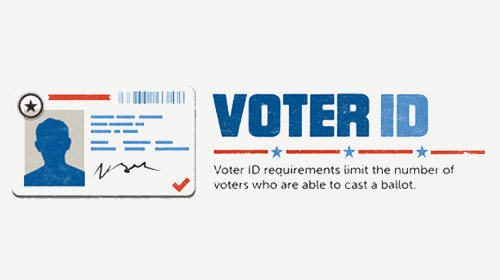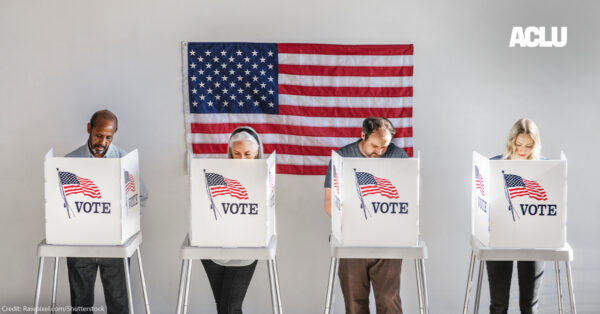Federal Appeals Court Revives Challenge to Wisconsin’s Voter ID Law
CHICAGO – A federal appeals court has directed a lower court to consider the claims of voters who have trouble obtaining identification under Wisconsin’s strict voter ID law.
During oral arguments last week, the American Civil Liberties Union asked the U.S. Court of Appeals for the Seventh Circuit to give voters that opportunity.
Sean Young, an attorney with the ACLU’s Voting Rights Project, said:
“The court ruled that eligible voters facing difficulty obtaining ID have the right to challenge Wisconsin’s strict voter ID law. This ruling gives them the chance to go back to the lower court to make their case. This is a victory for the voters of Wisconsin.”
The ruling is at: https://www.aclu.org/legal-document/frank-v-walker-ruling
More information about this case, Frank v. Walker, is at: https://www.aclu.org/cases/frank-v-walker-fighting-voter-suppression-wisconsin

Voting Rights
Frank v. Walker: Fighting Voter Suppression in Wisconsin

Voting Rights
Frank v. Walker: Fighting Voter Suppression in Wisconsin
Stay informed
Sign up to be the first to hear about how to take action.
By completing this form, I agree to receive occasional emails per the terms of the ACLU's privacy statement.
By completing this form, I agree to receive occasional emails per the terms of the ACLU's privacy statement.
Learn More About the Issues in This Press Release
Related Content
- New York Supreme CourtAug 2025

Voting Rights
Clarke V. Town Of Newburgh (amicus). Explore Case.Clarke v. Town of Newburgh (Amicus)
The ACLU, New York Civil Liberties Union, ACLU of Southern California, and ACLU of Northern California filed an amicus brief in the New York Court of Appeals arguing that the New York Voting Rights Act is constitutional legislation designed to combat and remedy modern forms of discrimination in voting affecting New York. At stake in this case is whether New York’s courts uphold the State legislature’s decision to protect the freedom to vote for all New Yorkers by ensuring voters are not subjected to discrimination when participating in the political process.Status: Ongoing - PennsylvaniaAug 2025

Voting Rights
Eakin V. Adams County Board Of Elections (amicus). Explore Case.Eakin v. Adams County Board of Elections (Amicus)
In November 2022, thousands of Pennsylvania voters were denied the right to vote based on a meaningless paperwork error. They filled out their mail ballots, signed the form on the outer return envelope, and returned their ballots on time. Yet their ballots were not counted, because they either forgot to write the date on their return envelope, or they accidentally wrote the wrong date. We're fighting to make sure that every vote countsStatus: Ongoing - Press ReleaseAug 2025

Voting Rights
Court Agrees Alabama’s State Senate Districts Violate The Voting Rights Act. Explore Press Release.Court Agrees Alabama’s State Senate Districts Violate the Voting Rights Act
BIRMINGHAM, AL – In a mixed ruling on Alabama’s state Senate redistricting case, a federal court has found that the state’s map violates the Voting Rights Act in Montgomery but upheld the current map makeup in the Huntsville area. The decision is an important victory for Black voters, though advocates stress that Alabama still has work to do to ensure its maps provide fair representation. The lawsuit, filed by the American Civil Liberties Union, ACLU of Alabama, Legal Defense Fund, and Southern Poverty Law Center (SPLC) argued that Alabama’s 2021 State Senate districting plan artificially diluted the political power of Black Alabamians by cracking significant Black communities in the Huntsville area and packing Black voters in unnecessarily large numbers into one State Senate district in the Montgomery area. The combination of these districting lines with the ongoing effects of racial discrimination means that these districts resulted in Black residents of these areas having an unequal opportunity to elect their preferred candidates to the state Senate. The court’s decision requires Alabama to redraw the Montgomery-area Senate district but leaves the Huntsville districts intact. "This decision proves that when we challenge injustice, we can make progress. Alabama must now draw fairer districts in Montgomery, but let’s be clear—leaving Huntsville untouched still denies many Black Alabamians their rightful representation,” said Benard Simelton, president of the Alabama State Conference of the NAACP. “We celebrate this win while demanding the state finish the job and deliver maps that reflect the full power of our communities." “We are pleased that the court recognized the injustice in Montgomery and is requiring Alabama to fix its unlawful redistricting,” said Davin Rosborough, deputy director of the ACLU’s voting rights project. “While we are disappointed that Black voters in Huntsville will continue to be denied fair representation, the fight is far from over.” “Today’s decision is a hard-fought victory for Black voters in Montgomery who deserve fair representation in the Alabama Senate,” said Deuel Ross, Director of Litigation at LDF. “The court's decision recognizes that, even today, the State continues its terrible history of discriminating against Black voters. While we welcome this win, leaving the Huntsville district in place illustrates that voters must continue to fight for their voices to be heard.” “This decision isn’t simply a victory for Black voters in Alabama, but all voters in the state. The courts have reviewed the evidence and concluded that the Alabama State Legislature systematically diluted the voting power of Black Alabamians by drawing unfair districts,” said Jack Genberg, Senior Supervising Attorney, Democracy and Voting Rights Litigation Team, Southern Poverty Law Center. “This ruling underscores the urgent need to reform our redistricting process and restore meaningful voter participation to ensure fair and equitable rights for all people of this state.” Read the full ruling here: https://assets.aclu.org/live/uploads/2025/08/AL-NAACP-v.-Allen.pdfCourt Case: Alabama State Conference of the NAACP v. AllenAffiliate: Alabama - Press ReleaseAug 2025

Voting Rights
Federal Court Orders Mississippi Supreme Court District Lines Be Redrawn. Explore Press Release.Federal Court Orders Mississippi Supreme Court District Lines Be Redrawn
OXFORD, Miss. — A federal court today ruled that Mississippi’s Supreme Court district lines must be redrawn to ensure Black voters have an equal opportunity to elect candidates of their choice. The American Civil Liberties Union, ACLU of Mississippi, Southern Poverty Law Center (SPLC), and Simpson Thacher & Bartlett LLP brought the challenge on behalf of individual Black civic leaders, including business and civic leader Dyamone White; Ty Pinkins, a 20-year Army veteran and Georgetown Law graduate; educator Constance Slaughter Harvey-Burwell; and Mississippi Senate Minority Leader Derrick Simmons of Greenville. At trial, Plaintiffs successfully argued the current district lines severely diluted the voting strength of Black residents in state Supreme Court elections, in violation of the Voting Rights Act of 1965. Under the challenged lines, the state’s nine-member Supreme Court has had only four Black justices in its entire history, each one appointed in succession by the governor to the same seat. Mississippi is nearly forty percent Black by population. The Supreme Court district lines have remained almost entirely unchanged for over a century save for a minor shift of four counties in 1987. They cut the historically Black Mississippi Delta region in half, preventing the candidates preferred by Black voters from being elected. The Mississippi Legislature will be tasked with implementing the court’s order by drawing new district lines that provide Black voters with a full and fair opportunity to elect candidates of choice. The following is reaction to today’s ruling: “This win corrects a historic injustice,” said Ari Savitzky, senior staff attorney with the ACLU’s Voting Rights Project. “All Mississippians will benefit from fair district lines that give Black voters an equal voice — and new generations of Black leaders an equal chance to help shape the state’s future by serving on the state’s highest court.” “Throughout our state’s history, Black voters have been boxed out from choosing justices who make decisions about our lives and our rights,” said business and civic leader Dyamone White, lead Plaintiff. “Today’s ruling restores hope that Mississippi’s future will be guided by a judiciary chosen by all of the people—not just some. This victory is bigger than me—it’s a powerful affirmation of fair representation." “This ruling is a historic victory for fairness and justice in Mississippi,” said Senator Derrick T. Simmons, Mississippi Senate Minority Leader. “For too long, the lines for our Supreme Court districts diluted the voices of Black voters and denied them a fair opportunity to elect candidates of their choice. The court’s decision affirms what we have long known—that our democracy works best when every community has equal representation. This ruling is not just a win for the other plaintiffs and me, but for every Mississippian who believes in the fundamental promise of equal justice under the law.” “Today’s win is a victory for all Mississippians. Our state succeeds when it embraces its diversity and welcomes all voices. This ruling acknowledges that the current Supreme Court district lines silence too many Black Mississippians. Thanks to this federal court’s decision, Black voters will have a more equal say in who serves on our state’s highest court,” said Jarvis Dortch, executive director of the ACLU of Mississippi. "All Mississippians deserve the right to have their vote counted. This victory is a great leap forward for protecting the most fundamental right in this nation, voting," said Ahmed Soussi, senior staff attorney at the SPLC. "Black voters will now have an equal voice in shaping and forming the highest court in the Magnolia State. We look forward to the redistricting process and ensuring a fair map is passed." “Voting is the cornerstone of a functioning democracy. This decision affirms that principle by recognizing the importance of fair and legal districting. All Mississippi citizens must have a full and fair opportunity to shape the judiciary that serves them,” said Jon Youngwood, Co-Chair of Simpson Thacher’s Litigation Department. This ruling can be found online here: https://assets.aclu.org/live/uploads/2025/08/2025.08.19.d-ORDER-AND.pdfCourt Case: White v. Mississippi State Board of ElectionsAffiliate: Mississippi